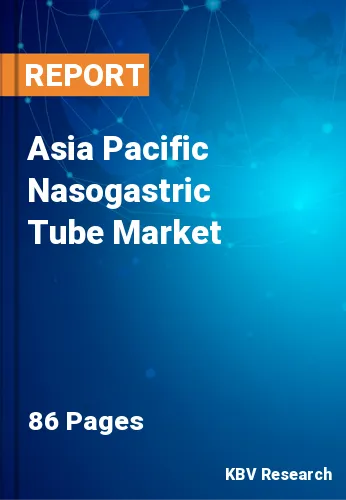The Asia Pacific Nasogastric Tube Market would witness market growth of 5.6% CAGR during the forecast period (2022-2028).
An NG tube may also be utilized to remove chemicals from the stomach. The most common indication for nasogastric tube implantation is to decompress the stomach in the event of a distal blockage. Small bowel obstruction due to adhesions or hernias, ileus, obstructive neoplasms, intussusception, volvulus, and many other causes can restrict the normal transit of body fluids, including salivary, gastric, hepatobiliary, and enteric secretions. The accumulation of these fluids will result in abdominal distension, discomfort, and nausea.
The fluids will accumulate to the point where nausea will develop into emesis, placing the patient in danger of aspiration. The NG tube with a single lumen features a thin channel for delivering drugs and nourishment into the stomach. Since it could stay in place for several weeks, the channel has a small diameter ("small bore") to make it as convenient as possible. The double-lumen NG tube is developed specifically for suctioning but can also serve other functions. It includes two channels: a larger one for suctioning and a smaller one for venting air to relieve vacuum pressure. This prevents the tube from adhering to the stomach lining during suctioning.
It is estimated that 34 nations will have over 20% of their population over 65 by 2030. As a result of increased life expectancy and declining birth rates, China's population of adults over the age of 60 is expected to rise to 28% by 2040. This tremendous demographic shift makes feasible the construction of an integrated system that satisfies the social and health needs of older people while guaranteeing everyone has access to health care regardless of location. In addition, a rapidly ageing population needs to construct age-friendly communities and towns where the elderly can thrive and contribute significantly to society. To improve access to integrated care, China has been researching innovative techniques. This is also anticipated to raise the regional demand for nasogastric tubes.
The China market dominated the Asia Pacific Nasogastric Tube Market by Country in 2021, and would continue to be a dominant market till 2028; thereby, achieving a market value of $51.1 million by 2028. The Japan market is estimated to grow a CAGR of 4.9% during (2022 - 2028). Additionally, The India market would exhibit a CAGR of 6.2% during (2022 - 2028).
Based on Indication, the market is segmented into Dysphagia, Chronic Kidney Disease, Inflammatory Bowel Disease (IBD), Esophageal Cancer, Stomach Cancer and Others. Based on Patient Type, the market is segmented into Adult, Geriatric and Pediatric. Based on Type, the market is segmented into Small-bore Feeding Tubes and Large-bore Feeding Tubes. Based on End-Use, the market is segmented into Hospitals & Nursing Homes and Home Care. Based on countries, the market is segmented into China, Japan, India, South Korea, Singapore, Malaysia, and Rest of Asia Pacific.
Free Valuable Insights: The Worldwide Nasogastric Tube Market is Projected to reach USD 669.5 Million by 2028, at a CAGR of 5.2%
The market research report covers the analysis of key stake holders of the market. Key companies profiled in the report include Becton, Dickinson and Company, Medtronic PLC, Cardinal Health, Inc., QMD, Angiplast Pvt. Ltd., Securmed Spa, Vygon SAS, Andersen Products, Inc. (Weiler Abrasives Group), Guangdong Baihe Medical Technology Co., Ltd. and Poly Medicure Ltd.
By Indication
By Patient Type
By Type
By End-Use
By Country
Our team of dedicated experts can provide you with attractive expansion opportunities for your business.

